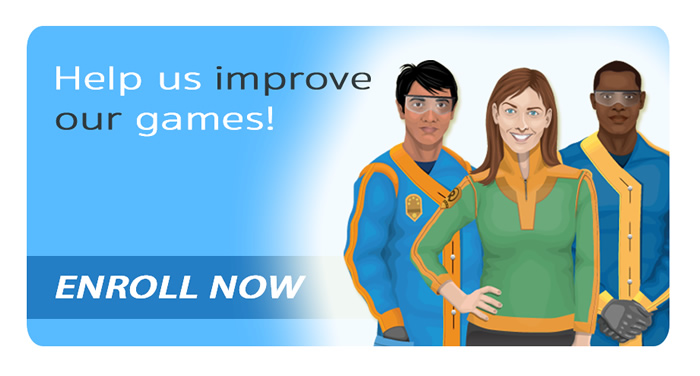Not to worry. Our team has created a Flash Game Archive. There you will find instructions on how to download the standalone Flash Player,
along with links to download all games within the Web Adventures catalog and play them offline.
|
12/10/2012
CSI Web Adventures
Conference:
Created through a grant from the National Science Foundation, the CSI web adventure series is a companion to the traveling museum exhibit, CSI: The Experience. The focus is on teaching adolescents and families accurate and engaging forensic science, while inspiring careers in science. Responses from teachers who incorporate a forensic unit into their science curriculum has indicated a place for this website in the classroom setting. The CSI web adventure series consists of three cases with an accompanying educators' guide and online activities. In this session, all three CSI cases will be presented. CSI case one provides a guided learning experience that trains students in different forensic science specialties and techniques, such as DNA profiling, ballistics, and toxicology. Cases two and three are more open ended and exploratory, allowing students to investigate a crime scene to collect evidence, question suspects, analyze evidence with virtual forensics experiments, and present their findings to solve the crime.
|
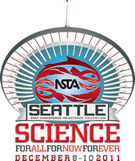 |
|
Teach Science Content and Inspire STEM Careers with FREE Online Web Adventures
Conference:
We will present free online games, called web adventures, that allow students to "become a scientist" within a virtual world. While solving a mystery or a case presented in the games, players learn the underlying science and experience how the acquired science knowledge and skills can be used in a career. They engage in virtual activities such as DNA fingerprinting, animal experiments, or brain imaging. We portray a variety of science careers across our games, including neurobiology, toxicology, medical examiner, microbiology, and forensic biology.
|
 |
|
12/9/2011
Medical Mysteries Web Adventures
Conference:
Grants from the National Institute of Allergy and Infectious Diseases and from the National Center for Research Resources have provided funding to create an episodic web adventure series, with accompanying classroom activities, teacher support materials, and magazines. The focus is on teaching middle school students about infectious diseases while reinforcing the scientific method and encouraging careers in health/science. In this session, all seven MedMyst missions will be presented. This free web adventure allows students to use inquiry and process skills to investigate pathogens, the diseases they cause, and the body's immune response. Students will perform virtual experiments, such as case-control studies, a Koch's postulates reenactment, necropsies, and viral microarrays. These virtual experiments will engage students in formulating hypotheses, identifying independent and dependent variables, identifying experimental and control groups, analyzing data, interpreting charts and graphs, and drawing conclusions.
|
 |
|
12/8/2011
Teaching Science in the Context of Substance Abuse with Free Online Web Adventures
Conference:
We will present four different online science games, called web adventures, that teach the science behind the biological effects of alcohol, opiates, club drugs, and inhalants on the body. In each game, students are presented with a substance abuse related case or "mystery". During the game, students engage in virtual labs (such as brain imaging or animal experiments), data analysis, and problem solving to discover the ways abused substances act on the body. Visualizations show neurotransmitter actions and neuron functions with the various drugs. Students need to apply the acquired science knowledge and process skills to solve the game.
|
 |
|
Go Beyond the Scientific Method to Experimental Design
Conference:
Inquiry is at the heart of understanding science, and experimental design where students experience what these processes really mean. Yet, with a large number of middle-school-aged students, it is a challenge to guide them in the design process without feeling like you need to clone yourself! My desire to have students experience open inquiry design has led me to compile materials that have greatly improved my ability to teach students the scientific method, processes, and ultimately experimental design. It starts with a graphic organizer (posted free online) that guides students into brainstorming ideas using Post It Notes. They choose two of their ideas and those become the independent and dependent variables in their developing experimental plan. The chosen Post It Note variables then follow throughout the graphic organizer as students develop a hypothesis, experimental plan, data tables and graphs, and reach their conclusions. It even allows them to see how they will control all other variables. After finishing, it shows them how they can choose from among their other variables to design further experimentation.
|
 |
|
11/18/2011
Experimental Design CAN Happen
Conference:
Getting 150+ middle school students to go beyond just following my experimental directions and be able to get to the level where they can identify their own independent and dependent variables, design and carry out their experimental steps, create their own data tables and graphs to display their results, and communicate clear conclusions, used to seem impossible. But using these tools has made the task possible in my classroom. I will also show you a free online site that reinforces these concepts using a web adventure approach. In this free online program, students will follow a microbiologist, epidemiologist, and veterinarian and watch them use hypotheses, variables, controls, and data interpretation in their job settings.
|
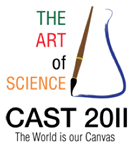 |
|
11/17/2011
CSI: A FREE Online Adventure Game that Engages Students in Technology while Teaching Forensic Science
Conference:
The CSI web adventure series consists of three cases with, an accompanying educators' guide, and online activities. The focus is on teaching adolescents and families accurate and engaging forensic science, while inspiring careers in science. In this session, all three CSI cases will be presented. CSI case one provides a guided learning experience that trains students in different forensic science specialties and techniques, such as DNA profiling, ballistics, medical autopsy, and toxicology. Cases two and three are more open ended and exploratory, allowing students to investigate a crime scene to collect evidence, question suspects, analyze evidence with virtual forensics experiments, and present their findings to solve the crime.
|
 |
|
Teaching Science in the Context of Substance Abuse through FREE online Web Adventures
Conference:
In each game, students are presented with a substance abuse related case or "mystery". During the game, students engage in virtual labs (such as brain imaging or animal experiments), data analysis, and problem solving to discover the ways abused substances affect the body. Visualizations show neurotransmitter actions and neuron functions with the various drugs. Students apply the acquired science knowledge and process skills to solve the game.
|
 |
|
Medical Mysteries Web Adventures: Teach Microbiology, Reinforce Process Skills, and Incorporate Technology into your Curriculum
Conference:
The focus is on teaching middle school students about infectious diseases while reinforcing the scientific method and encouraging careers in health/science. In this session, all seven MedMyst missions will be presented. This free web adventure allows students to use inquiry and process skills to investigate pathogens, the diseases they cause, and the body's immune response. Students will perform virtual experiments, such as case-control studies, a Koch's postulates reenactment, necropsies, and viral microarrays. These virtual experiments will engage students in formulating hypotheses, identifying independent and dependent variables, establishing experimental and control groups, analyzing data, interpreting charts and graphs, and drawing conclusions. National Science Education Content Standards and the Benchmarks for Science Literacy are the basis around which the web adventures were developed.
|
 |
|
COOL SCIENCE CAREERS: Play the role of different scientists through free online games
Conference:
Designed for middle and high school students, the website currently offers interactive games related to epidemiology, neuropsychology, toxicology, neurobiology, and neuroradiology. Players can "try out" each career through interactive simulations. For example, players analyze results of MRIs, perform an animal experiment, replicate a memory test, conduct a case-control study, and evaluate the results of GC/MS analysis.
|
 |
|
11/12/2011
Teaching Science in the Context of Substance Abuse with Free Online Web Adventures
Conference:
We will present four different online science games, called web adventures, that teach the science behind the biological effects of alcohol, opiates, club drugs, and inhalants on the body. In each game, students are presented with a substance abuse related case or "mystery". During the game, students engage in virtual labs (such as brain imaging or animal experiments), data analysis, and problem solving to discover the ways abused substances act on the body. Visualizations show neurotransmitter actions and neuron functions with the various drugs. Students need to apply the acquired science knowledge and process skills to solve the game.
|
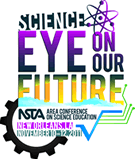 |
|
Experimental Design CAN Happen
Conference:
Combining a free online web adventure program that reinforces the scientific method with a graphic organizational tool that guides students into completing the experimental design process from start to finish has proven to be an effective teaching method in my middle school classroom. With large numbers of students of varying ability levels, I once felt this important inquiry component was impossible with all of my students. But this series of tools has helped all levels of students be able to understand how to brainstorm ideas, choose independent and dependent variables from them, and move them from the beginning to the end of the experimental design process. Post It Notes are easily manipulated to help achieve the visual of the common threads throughout the experiment. The ability to do open inquiry design and truly understand the process and to survive the experience as a teacher has been achieved in my classroom of 150+ gifted to resource to ELL students using these tools.
|
 |
|
11/11/2011
CSI Web Adventures
Conference:
Created through a grant from the National Science Foundation, the CSI web adventure series is a companion to the traveling museum exhibit, CSI: The Experience. The focus is on teaching adolescents and families accurate and engaging forensic science, while inspiring careers in science. Responses from teachers who incorporate a forensic unit into their science curriculum has indicated a place for this website in the classroom setting. The CSI web adventure series consists of three cases with an accompanying educators' guide and online activities. In this session, all three CSI cases will be presented. CSI case one provides a guided learning experience that trains students in different forensic science specialties and techniques, such as DNA profiling, ballistics, and toxicology. Cases two and three are more open ended and exploratory, allowing students to investigate a crime scene to collect evidence, question suspects, analyze evidence with virtual forensics experiments, and present their findings to solve the crime.
|
 |
|
Medical Mysteries Web Adventures
Conference:
Grants from the National Institute of Allergy and Infectious Diseases and from the National Center for Research Resources have provided funding to create an episodic web adventure series, with accompanying classroom activities, teacher support materials, and magazines. The focus is on teaching middle school students about infectious diseases while reinforcing the scientific method and encouraging careers in health/science.
|
 |
|
11/10/2011
Teach Science Content and Inspire STEM Careers with FREE Online Web Adventures
Conference:
We will present free online games, called web adventures, that allow students to "become a scientist" within a virtual world. While solving a mystery or a case presented in the games, players learn the underlying science and experience how the acquired science knowledge and skills can be used in a career. They engage in virtual activities such as DNA fingerprinting, animal experiments, or brain imaging. We portray a variety of science careers across our games, including neurobiology, toxicology, medical examiner, microbiology, and forensic biology.
|
 |
|
10/28/2011
Teaching Science in the Context of Substance Abuse with Free Online Web Adventures
Conference:
We will present four different online science games, called web adventures, that teach the science behind the biological effects of alcohol, opiates, club drugs, and inhalants on the body. In each game, students are presented with a substance abuse related case or "mystery". During the game, students engage in virtual labs (such as brain imaging or animal experiments), data analysis, and problem solving to discover the ways abused substances act on the body. Visualizations show neurotransmitter actions and neuron functions with the various drugs. Students need to apply the acquired science knowledge and process skills to solve the game.
|
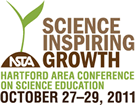 |
|
Medical Mysteries Web Adventures
Conference:
Grants from the National Institute of Allergy and Infectious Diseases and from the National Center for Research Resources have provided funding to create an episodic web adventure series, with accompanying classroom activities, teacher support materials, and magazines. The focus is on teaching middle school students about infectious diseases while reinforcing the scientific method and encouraging careers in health/science.
|
 |
|
10/27/2011
Teach Science Content and Inspire STEM Careers with FREE Online Web Adventures
Conference:
We will present free online games, called web adventures, that allow students to "become a scientist" within a virtual world. While solving a mystery or a case presented in the games, players learn the underlying science and experience how the acquired science knowledge and skills can be used in a career. They engage in virtual activities such as DNA fingerprinting, animal experiments, or brain imaging. We portray a variety of science careers across our games, including neurobiology, toxicology, medical examiner, microbiology, and forensic biology.
|
 |
|
CSI Web Adventures
Conference:
Created through a grant from the National Science Foundation, the CSI web adventure series is a companion to the traveling museum exhibit, CSI: The Experience. The focus is on teaching adolescents and families accurate and engaging forensic science, while inspiring careers in science. Responses from teachers who incorporate a forensic unit into their science curriculum has indicated a place for this website in the classroom setting.
|
 |
|
Designing Experiments: It Can Be Done
Conference:
Experimental design is at the root of students understanding experimentation. Knowing a series of steps is NOT what this is about, yet when teaching 150+ students and wanting them to get to the designing phase, something has to be done to guide the process. |
 |
|
7/20/2011
MedMyst: Teaching about infectious diseases with free, interactive web adventures
Conference: This workshop is for middle school science teachers who are looking for ways to teach the topic of infectious diseases and the scientific method in an exciting and relevant context. The workshop will focus on the use of interactive web adventures developed at Rice University. Students find these programs a unique way to learn; they enjoy the engaging storylines and the embedded games. During this workshop teachers will have the opportunity to play the web adventures and also learn other hands-on activities to use in the classroom.
Using MedMyst programs in the classroom will teach pathogens, infectious diseases, and the body's immune response. The latest MedMyst program has an added element – teaching students about three science career pathways while helping them understand how the scientific method is applied within these professions. Process skill application is built into each program, and activities which support the programs and reinforce the concepts being taught are included.
|

|
|
7/19/2011
Uncommon Scents: Teaching about environmental pollutants with free, interactive web adventures
Conference: This workshop is for middle school science teachers who are looking for ways to teach the topics of environmental pollutants and the scientific method in an exciting and relevant context. The workshop will focus on the use of interactive web adventures developed at Rice University. Students find these programs a unique way to learn; they enjoy the engaging storylines and the embedded games. During this workshop teachers will have the opportunity to play the web adventures and also learn other hands-on activities to use in the classroom.
Uncommon Scents is a web adventure that shows students the risks of environmental pollutants. Industrial and home settings each have chemicals that can be dangerous if misused. Interactive simulations of how toxic chemicals can affect the body's nervous system provide students with visuals that help them understand the science behind what is happening. The risk of inhalant use is the natural connection that is drawn from the scenario.
|

|
|
6/9/2011
MedMyst Workshop at the CDC
Conference: The workshop is designed for middle-school science teachers who are looking for ways to teach the topics of infectious diseases, pathogens, and the scientific method in an exciting and relevant context. The workshop will focus on the use of interactive web adventures developed at Rice University with funding from the National Institutes of Health. MedMyst, short for Medical Mysteries, has been tested with middle-school students and proven to be an effective way for students to learn about the variety of infectious agents and the human body response system. The web site and accompanying hands-on activities are free and aligned with the science standards.
During this two-day workshop teachers will have the opportunity to play the MedMyst adventure series and participate in related hands-on activities. During the second day of the workshop, teachers also will be given a tour of CDC's museum, and will learn from CDC professionals about CDC's work in controlling and preventing infectious diseases.
|

|
|
4/30/2011
Medical Mysteries: Explore the World of Infectious Diseases One Mystery at a Time!
Conference: |
|
3/12/2011
Medical Mysteries: A FREE Online Adventure Game using Technology, Microbiology, and the Scientific Method
Conference: The focus is on teaching middle school students about infectious diseases while reinforcing the scientific method and encouraging careers in health/science. In this session, all seven MedMyst missions will be presented.
This free web adventure allows students to use inquiry and process skills to investigate pathogens, the diseases they cause, and the body's immune response. Students will perform virtual experiments, such as case-control studies, a Koch's postulates reenactment, necropsies, and viral microarrays. These virtual experiments will engage students in formulating hypotheses, identifying independent and dependent variables, identifying experimental and control groups, analyzing data, interpreting charts and graphs, and drawing conclusions. National Science Education Content Standards and the Benchmarks for Science Literacy are emphasized throughout the web adventures. Our research has proven that the use of MedMyst is successful in supporting students' learning. Add a little mystery to your classroom by using these free resources to engage your students in technology while they learn about microbiology. See http://medmyst.rice.edu/
|
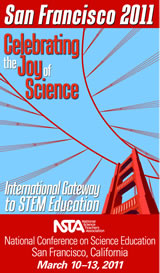
|
|
3/11/2011
CSI: A FREE Online Adventure Game That Engages Students in Technology While Teaching Forensic Science
Conference: The focus is on teaching adolescents and families accurate and engaging forensic science, while inspiring careers in science. In this session, all three CSI cases will be presented.
CSI case one provides a guided learning experience that trains students in different forensic science specialties and techniques, such as DNA profiling, ballistics, and toxicology. Cases two and three are more open ended and exploratory, allowing students to investigate a crime scene to collect evidence, question suspects, analyze evidence with virtual forensics experiments, and present their findings to solve the crime. Research has proven that the use of web adventures is successful in supporting students' learning and inspiring science careers. Add some excitement to your classroom by using these free online resources to engage your students in accurate and up-to-date forensic science. See http://forensics.rice.edu/
|

|
|
3/10/2011
Using FREE Online Games to Teach Science Content and Inspire STEM Careers
Conference: To give middle school students an idea of the variety of STEM career opportunities, it is critical to connect the dots between the science they experience in the classroom and how it relates to the real world and their future careers. However, exposing students in an inspiring way to STEM careers is often limited by time and budget constraints and a lack of resources. We have developed free online adventure games that allow students to "become a scientist" within a virtual world. While solving a mystery or a case presented in the games, players learn the underlying science and experience how the acquired science knowledge and skills can be used in a career. They engage in virtual activities such as DNA fingerprinting or brain imaging. We portray a variety of science careers across our games, including neurobiology, toxicology, medical examiner, microbiology, and forensic biology. Our games are accompanied by hands-on science activities and other classroom materials, as well as by a collection of links to science and career websites for the students to explore. The feedback from students that played our games is very powerful in terms of suggesting how authentic role-playing can influence and inspire a career choice.
|

|
|
3/5/2011
Explore Web Adventures Online
Conference: |

|

|
|
© 2025 Center for Technology in Teaching and Learning, Rice University
Web Adventures games are now generously hosted by The Rice University School Mathematics Project (RUSMP). FLASH NOT WORKING? See Adobe Flash Player EOL General Information Page. For other games issues, see our FAQs. The projects on this page are supported by grants from the National Institutes of Health and the National Science Foundation. This website is compliant with the Children's Online Privacy Protection Act. |


